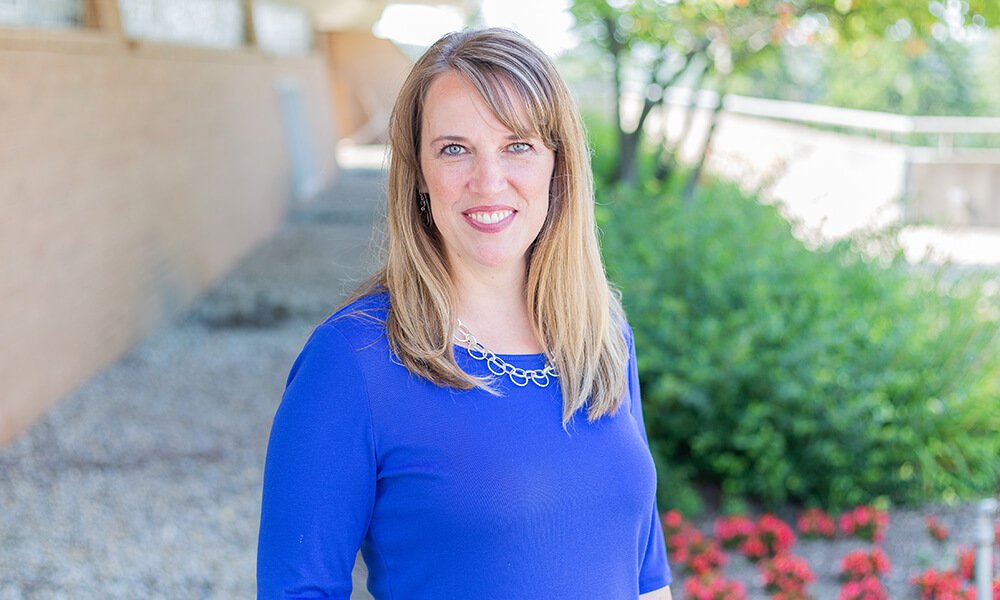
Editor's note: This story first appeared in the fall 2019 issue of the Concordian, the official magazine of Concordia University Wisconsin.
Stacy Hoeft’s earnest prayer has long been that the Lord would use her to make “the biggest, most positive impact” that she could within Lutheran schools.
These days, she’s working to fulfill her vocation as president and CEO of Lutheran Special Education Ministries (LSEM), which exists to connect Lutheran schools or churches nationwide with certified special education professionals, and with the specialized programming and resources they need but can’t always afford.
When she stepped into the role in 2015, one of her first formative directives to her staff was “Just say yes.” No matter the question, the answer was “Yes.” Her mantra was not motivated by some sort of hero complex, but, rather, by a recognition that families managing special needs all too often feel as if they’re stranded on a deserted island. Hoeft felt that an enthusiastic expression of LSEM’s sincere desire to extend a helping hand might just make families feel a little less alone.
And oftentimes LSEM did go on to offer seminal help. Under Hoeft’s charge, LSEM has expanded its reach from 37 Lutheran schools grades preschool through high school to almost 70 nationally and, for the first time this year, internationally (at Concordia International School in Hanoi, Vietnam).
Related: Mission minded—Darrel Bergelin
It’s all in an effort to keep more kids in Lutheran schools where they can regularly hear the message of Christ’s saving grace and love for them.
“I’ve seen so many Lutheran schools that have had to say to families, ‘We’re just not equipped to handle your child’s needs,’ and families end up having to choose between faith instruction and their special education needs,” Hoeft said. “It’s exciting that we get to be able to help the schools say, ‘We can take every kid and help them grow on all fronts.’”
It’s been a long road to get to the place where she’s currently at, however. In 2004—eight years after she graduated from CUW with her bachelor’s degree in elementary education—she involuntarily began an arduous journey that placed her in the midst of what “The Wall Street Journal” called one of “the most important religious liberty cases in a half century.”
In 2004, as the brand-new principal of Hosanna-Tabor Evangelical Lutheran School in Redford, Michigan, Hoeft was thrust into the national spotlight where she, the staff, and the school’s Board of Education were forced to silently endure years of public scrutiny over a decision made to dismiss a called teacher on staff. The teacher, bolstered by the backing of the Equal Employment Opportunity Commission (EEOC), decided to sue in federal court.
For the eight years that followed, Hoeft and her team were in the throes of a legal battle that held such weighty implications for the Church that it seemed at times an unbearable load to manage.
“There were many moments where I said, ‘I don’t want to be the one to bear all of this,’” Hoeft said. “We took a lot of criticism for how we dealt with things, and it was rough. Because we weren’t permitted to talk openly about the case while legal proceedings were underway, people often wrote their own version of the story. It was very difficult to be criticized for things that were either completely untrue or taken out of context.”
The details of the story may have varied from one teller to the next, but the crux of the legal struggle remained: Should government force a church entity to retain a called worker who violates church teachings?
Ultimately, in 2012, the U.S. Supreme Court decided unanimously that the answer was “no,” and in so doing upheld the principle that churches should be free to choose their leaders without government interference.
For her labors with the lawsuit and more, the Lutheran Education Association honored Hoeft earlier this year with its top honor, the Christus Magister award, given to educators who have made significant contributions to Lutheran education.
Related: Grad on the go—Hiwot Abebe
While she’s proud of the work that went into the case, she does not want it to be what defines her.
“My life’s ambition has always been to work with kids, and I felt like this case took me far from the kids. I hope that instead my legacy can be all the students who are touched through LSEM.”
Hoeft will attest that Lutheran education has had an undeniable effect on her own life. A proud alumna of CUW, Hoeft said many of her Concordia professors, in particular, had a profound impact.
“The influence my professors had on me as a teacher and the support they’ve given me even after leaving college has been huge,” Hoeft said. “They showed me how to be a teacher with a lot of compassion and passion. They modeled it. You saw it in them every day.”
Learn more about Concordia’s School of Education at cuw.edu/education.
The fall 2019 Concordian hit mailboxes the end of September. View a PDF version of the magazine here. If you are not on our mailing list, but are interested in receiving a free copy, call 262-243-4333.
— This story is written by Kali Thiel, director of university communications for Concordia University Wisconsin and Ann Arbor. She may be reached at kali.thiel@cuw.edu or 262-243-2149.
If this story has inspired you, why not explore how you can help further Concordia's mission through giving.